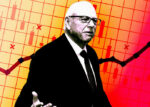When residential dealmaking dries up, brokerages have to find unconventional ways to generate money.
Douglas Elliman rolled out a payday loan service platform to its brokers, providing an alternate source of revenue as the industry braces for a down market.
Tongo, a third-party platform backed by New Valley Ventures, Elliman’s investment arm, lets brokers borrow up to 75 percent of a pending commission for a 3 to 5 percent fee charged every 30 days. Tongo announced last week that it had completed a $7 million seed round.
The move is a way to give brokers liquidity, said a spokesperson for Elliman, who insisted that it was unrelated to the humdrum state of the residential market.
“The timing comes entirely because we recently discovered Tongo and are enthusiastic about their solution,” the spokesperson said.
Read more


Still, a cooling market with less deal flow means that brokers may have to wait longer, for fewer checks. Tongo described its service as a “cash on demand” debit card product that could help agents stabilize cash flows.
And Elliman isn’t the only brokerage announcing new products. Keller Williams this month said it will provide wealth management training to its brokers, with an eye toward potentially licensing out such training to other firms. And commercial firm Walker & Dunlop is getting into the private lending business with Walker Private Lending, focused on multifamily property owners.
It’s all happening against the backdrop of extreme economic uncertainty. Cushman & Wakefield in late August predicted a mild recession driven by high oil prices and the ongoing Russian invasion of Ukraine. Ian Shepherdson, chief economist at Pantheon Macroeconomics, told the New York Post that home prices could fall by 20 percent through the middle of next year.
That could spell trouble for Elliman, which did not grow its revenue in line with some of its competitors in the second quarter. Elliman’s revenues rose just under 20 percent between the first and second quarters of this year, whereas Compass, eXp and Anywhere all saw rises of at least 30 percent.
Elliman’s stock is down 62 percent this year.
